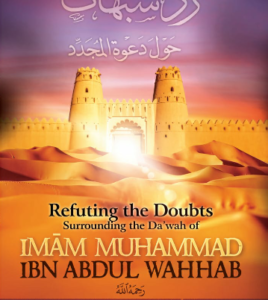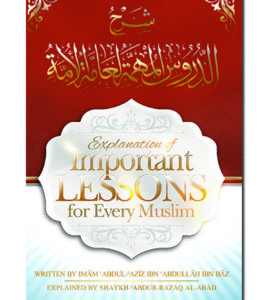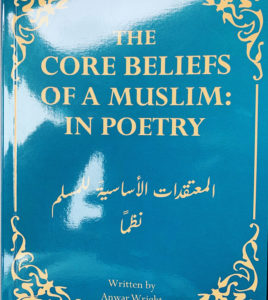Does Engaging In Refutation Disrupt Seeking Knowledge
The following question was posed during a gathering on the evening of 14 Ramadan, 1420H with the esteemed Salafee scholar Rabi’ ibn Hādī al-Madkhalī; the footnotes were compiled presented to him by Abū Rawāhah ‘Abdullāh Ibn ‘Isā al-Mawrī, a student of Shaikh Muqbil bin Hādī al-Wadi’ī.
Question: Many people are under the impression that engaging in refuting the People of Innovations and Desires disrupts the curriculum of study which has been devised for the student in his pursuit of knowledge for the sake of Allāh. Is this understanding correct?
Answer: this is an incorrect understanding and this is one of the tactics used by the people of falsehood and innovation to silence the tongues of the People of the Sunnah. Censuring the people of innovation is one of the greatest categories of commanding the good and forbidding the evil.
Nothing differentiates this Ummah from the rest of the nations except for this distinctive characteristic.
“You (true believers in Islāmic Monotheism and real followers of Prophet Muhammad and his Sunnah) are the best peoples ever raised up for mankind, you enjoin all that Islām has ordained and forbid all that Islām has forbidden and you believe in Allāh.” [Sūrah Aali Imrān 3:110]
Renouncing all that Islām has forbidden is applied through what the Muslim youth learns from comprehending the religion of Allāh and by his studying the Book of Allāh and the Sunnah of His Noble Messenger (صلى الله عليه و سلم)
If he does not establish the commanding the good and forbidding the evil that is designated for the people of innovation, perhaps he may enter into the statement of Allāh (تبارك و تعلى)
“Those among the Children of Isrā’il who disbelieved were cursed by the tongue of Dāwūd and ‘Isā, son of Maryam. That was because they disobeyed (Allāh and the Messengers) and were ever transgressing beyond bounds. They used to not forbid one another from the wrong which they committed. Vile indeed was what they used to do.” [Sūrah al-Mā’idah 5:78-79]
If he was to see that innovation has become widespread and it has those who are calling to it and those who campaign for it and defend it and wage war on the People of the Sunnah, how could he be silent?¹
Saying that: “This disrupts the acquisition of knowledge.” This is a lie, (rather) this is knowledge and (it is) from the practical application of that knowledge.
Under all circumstances, the student of knowledge should use all available means to specify time for acquiring knowledge, and without fail, he should be serious about attaining knowledge, for he will not be able to hold his own against the Munkar (wrongdoing) except with knowledge. So he, under all circumstances, acquires knowledge and at the same time applies it, and Allāh (تباك و تعالى) bestows His blessings upon this student who acts upon what he has learned. ²
The blessings (of knowledge) could be taken away when he sees evil deeds in front of him and says, “No! Not while I am seeking knowledge.” He sees abundant misguidance and he sees the people of falsehood raising the slogan of falsehood, calling to it and misguiding people, so this one says, “No! No! I will not occupy myself with these things, I will occupy myself with knowledge.” Really meaning that he will occupy himself with becoming learned in compromising, May Allāh bless you.³
[Source: اجوبة العلامة الشيخ ربيع بن هادي المدخلي السلفية عل اسءلة ابي رواحة المنهجية pg 34-35 Dar ul-Ãthār ©1427H/2006 C.E. Translated by Abū Amatullah Hasan ibn Hasan Ford and checked by Abū Mūsā Raha ibn Donald Batts, for more read “The Answers of the Esteemed Scholar Rabee ibn Hadi al-Madkhali on Questions Related to Minhaj” Ibrahim Books Publishing & Distribution ©2016C.E.]
_______________________________________________________________________
¹ Shaikh ul-Islām Abū Ismā’il al- Harawrī said: “I have been put to the sword five times and not once was it ever said to me, ‘Give up your madhhab, but it was said to me, Be silent about those who oppose you’, so I said, I will never be silent.” Siyar A’lam un-Nubulā v.18/pg.503
I [Abū Rawāhah] heard our Shaikh al-‘Allāmah Muqbil ibn Hadi saying: “If it were possible for them to spend millions of dollars to buy our silence, they would. But how preposterous is the idea that we would remain silent about falsehood.” And this recorded on his cassette tape ar-Radd ul-Wajeeh ‘ala as’ilati Ahlil-Baytil-Faqeeh. The poet said, “The thief is in my home and amongst my female relatives; fulfilling the lust and stifling the breath; and it is told to me, ‘No! Don’t hurt his feelings either.'”
² Ibn ul-Qayyim, in his book Miftāh Dār us-Sa’ādah, quotes some of the Salaf as saying, “We used to seek help in memorizing the knowledge by acting on it because abandoning acting upon knowledge is one of the strongest reasons for its disappearance and forgetting it.” Al-Khateeb (Al-Baghdadi) brings the chains of narration in his Jaami’ and in the book “Dispraise of the One Who Does Not Act on His Knowledge” by Ibn ‘Asākir pg. 15, which has an elegant chain of nine sons, each relating directly from their fathers all the way back to ‘Alī (رضى الله عنه) who said: “Knowledge calls for action, either it is answered or it leaves.” Likewise, the recompense for the one who does not act upon his knowledge is the fire, as in the marfu’ (elevated) Hadīth of Abū Hurairah (رضى الله عنه) “Verily the first people to be judged on the Day of Resurrection, then he mentioned some of them: A man who learns knowledge and teaches it and he recites the Qur’an, so he is bought and shown his favors and he will recognize them. Allāh will say, ‘What did you do with them?’, He will reply, ‘I learned knowledge and taught it and recited the Qur’an for Your sake’, and Allāh will say, ‘You have lied, rather you learned knowledge so that it would be said ‘He is a scholar’ and you recited the Qur’an so that it would be said ‘He is a Qāri (reciter)’ and therefore this is what was said, then it will be ordered for him to be dragged on his face until he is thrown into the fire” [Sahīh Muslim #1905]
t has been said in a verse of poetry: “The scholar who did not act on his knowledge is punished (in the hereafter) before the idol worshippers.”
³ Compare him to when Sufyān ath-Thawrī [d.161H], used to say: “Should I see evil and do not speak, and then I urinate blood!?” Siyar A’lām un-Nubulā v.7/pg. 259. Its meaning is that he sees the evil act and he does not have the ability to change it, so it causes him to suffer a great deal of stress, so much that he urinates blood.
⁴ For more information related to the topic read:
- The Methodology of Ahlus-Sunnah wal-Jamā’ah in Criticizing Individuals, Books and Groups by Shaikh Rabi’ Ibn Hadi al-Madkhali.
- Statements From the Scholars Regarding Clarifying the Callers to the Truth From the Callers to Falsehood by various Salafee scholars.
- The Difference Between Advising and Shaming by Imām Ibn Rajab al-Hanbalī
- How to Deal With the People of Innovation by Shaikh ‘Ubayd al-Jābirī
Trackbacks and pingbacks
-
clindamicina ketoconazol
[...] clindamicina ketoconazol[...] clindamicina ketoconazol
 (267) 428-1723
(267) 428-1723








Leave a Reply